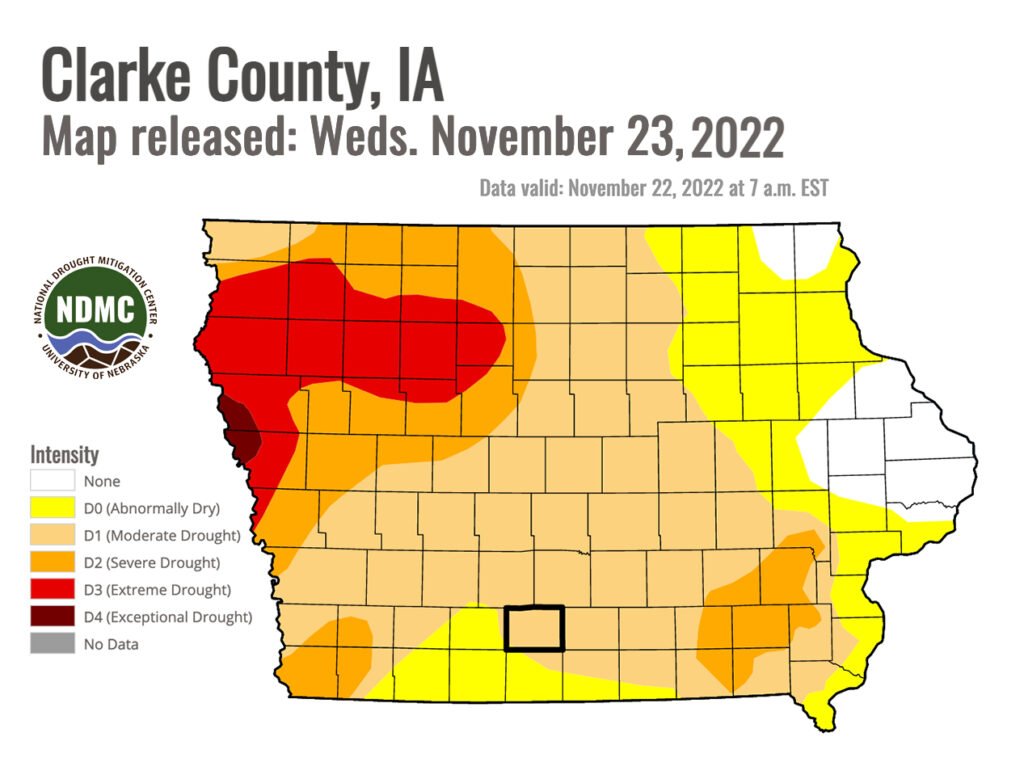For much of 2022, the State of Iowa has been at or hovering precariously close to severe drought levels. According to mid-October measurements, 57% of the state was experiencing moderate drought levels – an increase from 52% just weeks before. Moving into November, statewide averages improved, but with little increase in precipitation the Osceola Water Board moved to increase the city’s water conservation plan from Section 1: Water Watch to Section 2: Water Warning. According to Brandon Patterson, Osceola Water Superintendent, the Board decided to take this step based off of current water levels in West Lake and as a precautionary measure to mitigate potential water shortages in the spring and summer of 2023.
“The issues for Osceola regarding water supply at this point are two-fold,” said Patterson. “Water levels for West Lake are already below acceptable annual withdrawal rates and water quality continues to be a challenge.”
Currently, the daily safe raw water withdrawal rate out of West Lake – Osceola’s only current water source – is 900,000 gallons/day. Based on an engineer’s recent estimate, capacity of West Lake will likely decline to 800,000 gallons/day in the future. The most recent 12-month average shows a water withdrawal rate from West Lake at 1,479,994 gallons per day. With water usage projected to increase into the new year, the ability to source from West Lake at higher and lower intake levels becomes not only a quantity issue, but also a quality issue.
In the past, reduced lake levels along with water quality concerns have pushed the Board to utilize the lower intake source located at 20’ below normal pool levels. That option, as it stands, is considered non-viable due to poor water quality at that level – below Iowa State standards – potentially causing higher treatment costs.
“Until we can resolve the lower intake quality issues, the Osceola Water Board is tightening the water conservation standard based on the supply available to the top water intake at about 12 feet below normal pool level,” said Patterson.
The Osceola Water Board and staff are working diligently to address the intake issues. By working through an agreement with Liquid Engineering Corporation (LEC) out of Billings, Montana, come spring, divers will survey West Lake’s intake engineering, providing data on the viability of raising the lower intake. This will not only mitigate potential water quality issues when used, but continue to avoid algae and other contaminants found at the higher pool levels as the weather gets warmer.
Of course, moving the intake levels will not solve Osceola’s water shortage issue. Encouraging the community to conserve water, no matter the season, is an integral part of the Board’s ongoing water quality and management focus.
What does Section 2: Water Warning conservation plan mean to Osceola water customers?
A. Outdoor watering and irrigation is prohibited, except as follows.
B. Watering or irrigation of flower and vegetable gardens, trees and shrubs less than 4-years old, and new seeding or sod is permitted once a week with an application not to exceed 1-inch. Watering shall only be done between the hours of 8:00 P.M. to 8:00 A.M.
C. Car washing is prohibited, except at commercial establishments that provide that service.
D. No water shall be used to fill private swimming pools, children’s wading pools, reflecting pools or any other outdoor pool or pond.
E. No water shall be used to wash streets, parking lots, driveways, sidewalks or building exteriors.
F. No water shall be used for nonessential cleaning of commercial and industrial equipment, machinery, and interior spaces.
G. Water shall be served at restaurants only upon request of the customer.
Penalties for violation of the water warning restrictions range from a written notice on the first infraction up to a $130 surcharge for three or more violations.
While the move to this level of conservation, at this time of year, shouldn’t impact many within the community, the Osceola Water Board wants to make sure everyone is aware of the restrictions. Pending winter precipitation levels, the need for changes in conservation levels may require additional evaluation.
“We’d love to see more than normal precipitation this winter and coming spring,” said Patterson. “But due to El Niño, Osceola’s winter should be slightly warmer with less snow and ice than in 2021, and that’s concerning.”
